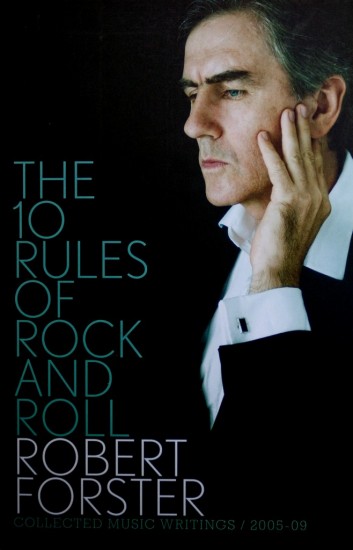The raging anti-consumerism of ‘Know Your Product’, the Saints’ fabulous punk age update of ‘(I Can’t Get No) Satisfaction’, set a standard no other Brisbane band could ever hope to match. Robert Forster, co-founder of that city’s other famous musical export The Go-Betweens, happily concedes this within the pages of The 10 Rules Of Rock & Roll when describing the long overdue reunion of Messrs Bailey and Kuepper in 2007. But any casual readers – not that there will be any – will surely delight in Forster’s perverse commercial logic. In an age where music is routinely given away and books are under pressure from copyright theft and indifference, this ragbag compilation of Australian magazine articles written for an Australian audience, and not one assumed to be blessed with knowledge either, is on sale to Brits. It’s signed and in a box, mind you, and accompanied by a four song EP of new Forster tunes for a mind-bending 75 quid.
Hang on, this is Robert Forster we’re talking about. Not Bob Dylan or Leonard Cohen or anyone good. He was in The Go-Betweens, for fuck’s sake, not the Velvet Underground (and he knows it, even including a perceptive essay on how the VU lit his own path, certain to resonate with anyone who grew up in the sticks and their own heads, in no particular order). Hell, as 80s flops went, even Prefab Sprout had a couple of actual hit singles. Though The Go-Betweens stock is high right now – despite successfully marrying soul and punk there is no Kuepper-Bailey bridge in Brisbane, but there is a G-B span, named by public poll – this may be a gouge too far.
Let’s emphasise this crassness, crassly. 75 fucking quid! As a writer Forster might be charitably described as keen. Few would argue with his essentially uncontroversial views, but these pieces read like a middle-aged man giving it all up to pursue his youthful dream of holding a staff job at the New Yorker. Most unexpectedly, Forster the critic trades in tropes that would never have found their way into a GBs lyric. It’s less a war against cliché than an accommodation with it (incredibly these tepid efforts have won awards down under, leaving me wondering just how bad other Aussie music writers can be). At least Forster’s musician’s ear gets a workout as he dwells lovingly on technical details of sound production that surely elude today’s MP3 generation (and before them, the boombox generation, and before them the AM generation, and before them the wax cylinder generation etc.)
It’s sweet to read a man who cares about front of house sound so much that he makes excuses for those who man the mixing desk, but it also suggests that he actually believes a shared way of hearing even exists. Touchingly this 50-year-old hauls himself around Brisbane’s Big Day Out site trying to find the perfect spot to hear Arcade Fire clearly, eventually climbing a fence into what may well be the disabled enclosure – he’s unclear on this, and possibly ashamed – just in time for the last two tunes.
Occasionally though, there’s something delightfully right about Forster’s wrongness; a literal world turned upside down. Growing up in 70s Pig City – Queensland was then perhaps the most corrupt English-speaking place on earth – unsurprisingly he romanticised distant art and music. This urge to escape or even transcend one’s surroundings while simultaneously craving acceptance is equally present in the early works of fellow boarding schoolboys the Birthday Party/Boys Next Door, who also took certain Velvets lyrics too literally (Forster never rolled round on the skagpile, although he did once dye his hair silver, a safer way of saluting Warhol).
Even 30 years later he thrills to the relative dispassion of a Nana Mouskouri performance at the Sydney Opera House, fascinated by the relatively unassimilated audience and imagining himself back in a sophisticated era when Nana wowed La Dolce Vita in Paris, Rome, Athens, Beirut and (for Brits) also warbled on The Two Ronnies every Saturday night. Less comprehensible to those from a different hemisphere are descriptions of Aus-talgia shows hosted by the ageless Molly Meldrum – Oz’s Fluff Freeman I guess – and a serious minded analysis of the now forgotten Delta Goodrem, pitched somewhere between OK and academia. Incidentally his 10 rules are hardly contentious, if somewhat less than convincing. ‘Great bands tend to look alike’ he suggests – did anyone tell the Ramones or the Birthday Party or [insert your choice here]?
A sweet tribute to his bandmate Grant McLennan, presumably written in shock, effectively admits that despite the cosiness engendered by 30 years collaboration, McLennan’s inherent sadness had always eluded him – even as Forster sang along with his gloomy and revealing songs. The sight of a copy of the New York Review of Books around his friend’s house leads Forster to wonder if he was the only rock star to have a subscription and this thought warms him. Yet 48 year-old-men often take the NYRB, and McLennan was a 48 year-old-man more than he’d ever been a rock star. (One of the most depressing and undignified performances I’ve ever seen was a crouched McLennan strumming his guitar in the corner of a meet and greet at New York’s CMJ conference in the mid 90s, his thoughtful songs unable to compete with free canapés and the chance to shake hands with the Mid-West sales team.)
But according to Forster, McLennan possessed an acutely tuned cultural sensibility (or ‘bullshit detector’, in Australian) equal to his unworldliness. It’s a pity we don’t have any examples to compare with his old co-worker, who now has his name on a book spine, just like J.D. Salinger and Katie Price. We’ll never know what he would have made of such a book selling for 75 quid, but had he lived this book would not exist. No great loss.

The 10 Rules Of Rock & Roll is published by Foruli. For more information, click here.



